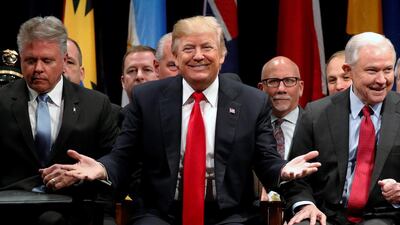Republicans working to execute their first major legislative achievement of Donald Trump's presidency appear to have secured the votes to pass a huge tax overhaul that Mr Trump hoped to present to the American people for Christmas.
"This is happening. Tax reform under Republican control of Washington is happening," the House speaker Paul Ryan of Wisconsin told rank-and-file members. "Most critics out there didn't think it could happen. And now we're on the doorstep of something truly historic."
It is the widest-ranging reshaping of the tax code in three decades and is expected to add to the nation's US$20 trillion debt. The tax cuts are projected to add $1.46tn over a decade. The Republicans plan to muscle it through Congress next week before its year-end break.
Under the bill, the current 35 per cent rate on corporations would fall to 21 per cent, the crown jewel of the measure for many Republicans. Mr Trump and Republican leaders had set 20 per cent as their goal but added a point to free money for other tax cuts that won over wavering policymakers in final talks.
The legislation would lower taxes on the richest Americans. Benefits for most other taxpayers would be smaller.
The bill would repeal an important part of the former US president Barack Obama's Affordable Care Act - the requirement that all Americans have health insurance or face a penalty - as the GOP, as the Republican party is commonly referred to, looks to unravel a law it failed to repeal and replace this past summer.
Only at the weekend did Republicans cement the needed support for the overhaul, securing endorsements from wavering senators.
Marco Rubio of Florida relented in his high-profile opposition after negotiators expanded the tax credit that parents can claim for their children. He said he would vote for the measure this week.
Mr Rubio had been holding out for a bigger child credit for low-income families. After he got it, he tweeted that the change was "a solid step toward broader reforms which are both pro-growth and pro-worker".
Senator Bob Corker of Tennessee, the only Republican to vote against the senate version earlier this month, made the surprise announcement that he would back the legislation. Mr Corker, the chairman of the senate foreign relations committee, has repeatedly warned that the nation's growing debt is the most serious threat to national security.
"I realise this is a bet on our country's enterprising spirit, and that is a bet I am willing to make," Mr Corker said.
___________
Read more:
US stocks hit fresh records as Trump tax cut nears completion
Snazzy new US Embassy in London unveiled with 'indoor Grand Canyon'
___________
The White House said Mr Trump "looks forward to fulfilling the promise he made to the American people to give them a tax cut by the end of the year".
The bill embodies a long-standing Republican philosophy that a substantial tax break for businesses will trigger economic growth and job creation for Americans in a trickle-down economy.
Sceptical Democrats are likely to oppose the legislation unanimously.
"Under this bill, the working class, middle class and upper middle class get skewered while the rich and wealthy corporations make out like bandits," said the senate minority leader Chuck Schumer of New York. "It is just the opposite of what America needs, and Republicans will rue the day they pass this."
The bill would drop the present 39.6 per cent top rate on individuals to 37 per cent. The standard deduction - used by around two-thirds of households - would be nearly doubled, to $24,000 for married couples.
The $1,000-per-child tax deduction would grow to $2,000, with up to $1,400 available in IRS refunds for families who owe little or no taxes. Parents would have to provide children's Social Security numbers to receive the child tax credit, a measure intended to deny the credit to people who are in the US illegally.
Those who itemise would lose some deductions. The deduction that millions use in connection with state and local income, property and sales taxes would be capped at $10,000. That is especially important to residents of high-tax states such as New York, New Jersey and California. Deductions for medical expenses that policymakers once considered eliminating would be retained.
The bill would allow homeowners to deduct interest only on the first $750,000 of a new mortgage, down from the current limit of $1 million.
People who inherit fortunes would get a big break. The bill would double the exemption, meaning the estate tax would apply only to the portion of an estate over $22m for married couples.

